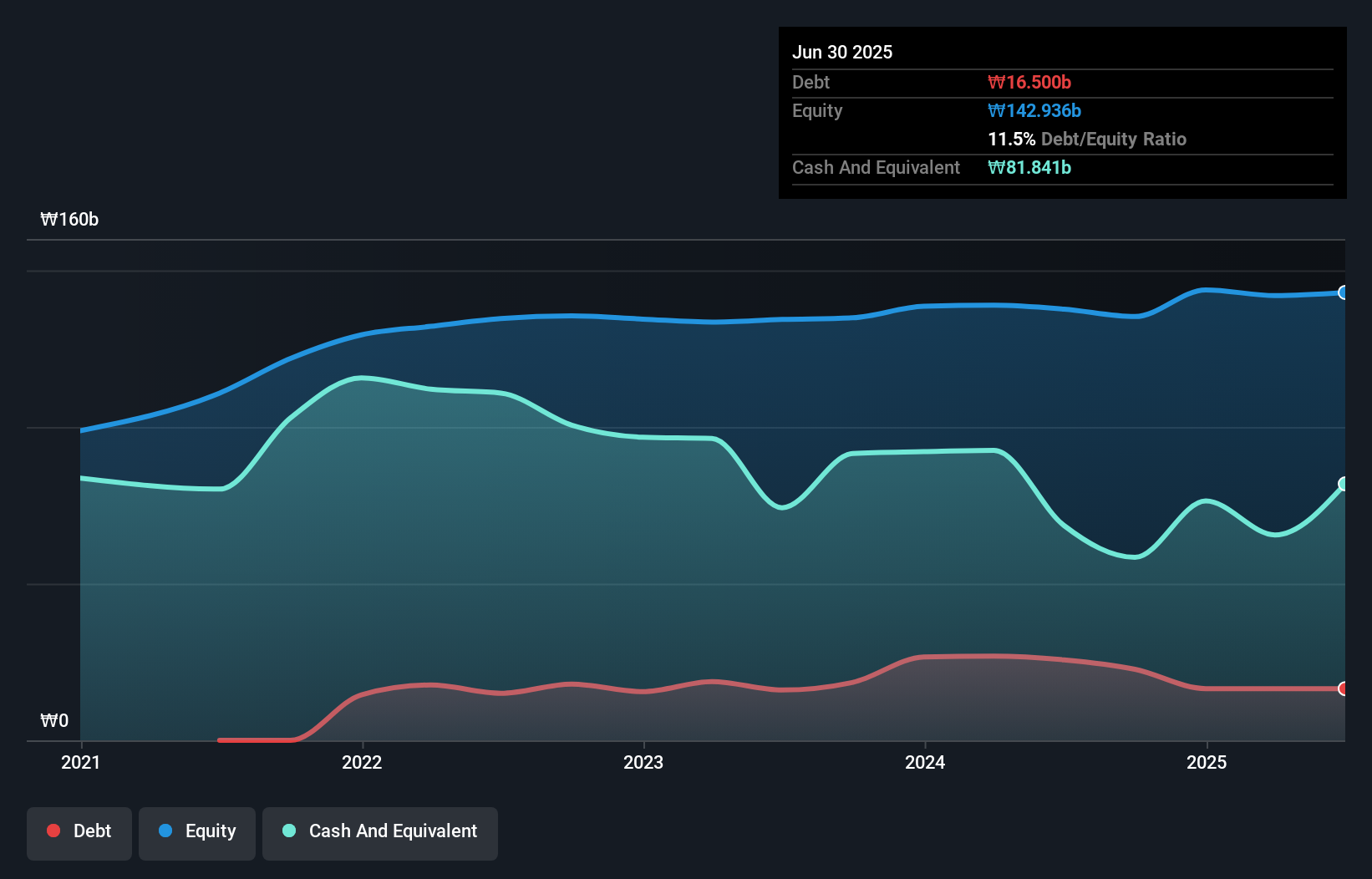- South Korea
- /
- Semiconductors
- /
- KOSDAQ:A187870
DEVICELtd (KOSDAQ:187870) Has A Pretty Healthy Balance Sheet
Warren Buffett famously said, 'Volatility is far from synonymous with risk.' It's only natural to consider a company's balance sheet when you examine how risky it is, since debt is often involved when a business collapses. We can see that DEVICE CO.,Ltd (KOSDAQ:187870) does use debt in its business. But is this debt a concern to shareholders?
When Is Debt A Problem?
Debt assists a business until the business has trouble paying it off, either with new capital or with free cash flow. In the worst case scenario, a company can go bankrupt if it cannot pay its creditors. However, a more common (but still painful) scenario is that it has to raise new equity capital at a low price, thus permanently diluting shareholders. Of course, debt can be an important tool in businesses, particularly capital heavy businesses. The first thing to do when considering how much debt a business uses is to look at its cash and debt together.
What Is DEVICELtd's Net Debt?
You can click the graphic below for the historical numbers, but it shows that DEVICELtd had ₩16.5b of debt in June 2025, down from ₩25.7b, one year before. However, its balance sheet shows it holds ₩81.8b in cash, so it actually has ₩65.3b net cash.

How Healthy Is DEVICELtd's Balance Sheet?
We can see from the most recent balance sheet that DEVICELtd had liabilities of ₩64.5b falling due within a year, and liabilities of ₩16.6b due beyond that. Offsetting this, it had ₩81.8b in cash and ₩1.27b in receivables that were due within 12 months. So it actually has ₩2.01b more liquid assets than total liabilities.
This short term liquidity is a sign that DEVICELtd could probably pay off its debt with ease, as its balance sheet is far from stretched. Simply put, the fact that DEVICELtd has more cash than debt is arguably a good indication that it can manage its debt safely.
View our latest analysis for DEVICELtd
Better yet, DEVICELtd grew its EBIT by 568% last year, which is an impressive improvement. That boost will make it even easier to pay down debt going forward. There's no doubt that we learn most about debt from the balance sheet. But you can't view debt in total isolation; since DEVICELtd will need earnings to service that debt. So when considering debt, it's definitely worth looking at the earnings trend. Click here for an interactive snapshot.
Finally, while the tax-man may adore accounting profits, lenders only accept cold hard cash. DEVICELtd may have net cash on the balance sheet, but it is still interesting to look at how well the business converts its earnings before interest and tax (EBIT) to free cash flow, because that will influence both its need for, and its capacity to manage debt. Over the last three years, DEVICELtd saw substantial negative free cash flow, in total. While investors are no doubt expecting a reversal of that situation in due course, it clearly does mean its use of debt is more risky.
Summing Up
While we empathize with investors who find debt concerning, you should keep in mind that DEVICELtd has net cash of ₩65.3b, as well as more liquid assets than liabilities. And it impressed us with its EBIT growth of 568% over the last year. So we don't have any problem with DEVICELtd's use of debt. The balance sheet is clearly the area to focus on when you are analysing debt. However, not all investment risk resides within the balance sheet - far from it. To that end, you should learn about the 3 warning signs we've spotted with DEVICELtd (including 1 which is concerning) .
If you're interested in investing in businesses that can grow profits without the burden of debt, then check out this free list of growing businesses that have net cash on the balance sheet.
New: Manage All Your Stock Portfolios in One Place
We've created the ultimate portfolio companion for stock investors, and it's free.
• Connect an unlimited number of Portfolios and see your total in one currency
• Be alerted to new Warning Signs or Risks via email or mobile
• Track the Fair Value of your stocks
Have feedback on this article? Concerned about the content? Get in touch with us directly. Alternatively, email editorial-team (at) simplywallst.com.
This article by Simply Wall St is general in nature. We provide commentary based on historical data and analyst forecasts only using an unbiased methodology and our articles are not intended to be financial advice. It does not constitute a recommendation to buy or sell any stock, and does not take account of your objectives, or your financial situation. We aim to bring you long-term focused analysis driven by fundamental data. Note that our analysis may not factor in the latest price-sensitive company announcements or qualitative material. Simply Wall St has no position in any stocks mentioned.
About KOSDAQ:A187870
DEVICELtd
Develops and supplies automatic control systems of semiconductors, displays, and material parts to semiconductor, LCD, and FPD manufacturers in South Korea and internationally.
Excellent balance sheet and good value.
Market Insights
Community Narratives




